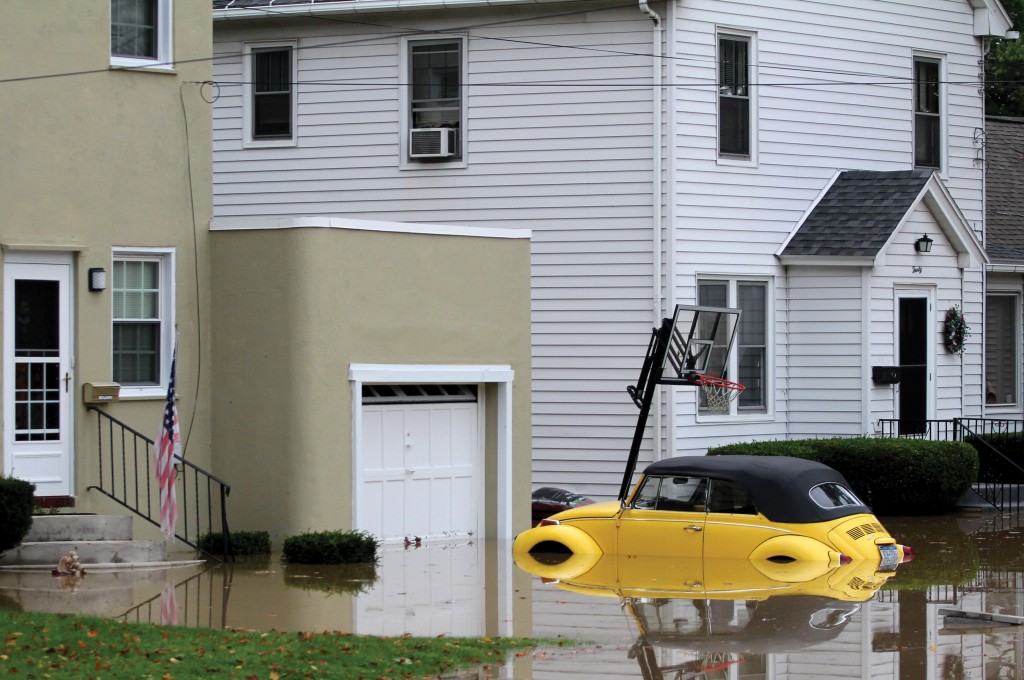Although the floods of September 2011 may be a distant memory for many students, many homeowners whose houses were damaged by the flood are still saddled with the financial consequences.
Some homeowners in Broome and Tioga Counties were not mandated to purchase flood insurance prior to last September, because local governments delayed implementation of flood-risk maps calculated by the Federal Emergency Management Agency (FEMA). The flood maps, designed to identify areas that face a high risk of flooding, were commissioned after the massive floods of 2006 but took more than three years to complete. The finalized maps would have forced at-risk homeowners to insure their homes.
Thousands of local property owners were warned in 2010 that their homes were within FEMA’s new flood-risk zones, and that they should consider purchasing flood insurance, but because they were not forced to purchase the insurance, many did not.
Those residents ended up with no means to recover from the flood, after the area suffered $1 billion in damages.
Flood maps for the area were supposed to take effect June 16, 2011 but homeowners balked at being forced to purchase flood insurance. As a result, local and state political leaders persuaded FEMA to delay the maps’ re-organization. People whose houses were located in flood-risk areas, and whose houses were federally insured or financed, would have been forced by their mortgage company to buy flood insurance.
With about 100,000 households in the area, only 3,397 flood insurance policies were in place by Nov. 30, 2011, according to federal flood insurance data for Broome and Tioga Counties. State and local inspection agencies determined that 5,318 properties were damaged and 21 of them were destroyed.
Kellie Duff, a flood victim and secretary for Binghamton University’s Center for Learning and Teaching, said she was discouraged from buying flood insurance because she was not in a mandated flood zone. She was told by an insurance agent that she could purchase costly insurance, but her home would most likely not be affected.
Mike Morosi, a spokesman for Congressman Maurice Hinchey (D-NY) who represents parts of Broome County, said that the congressman tried to balance the need for flood insurance in case of disaster with the financial pressure incurred by mandating insurance.
Morosi said that individuals could pay for flood insurance over a five-year period to make the cost more manageable.
“He [Hinchey] supported a plan that would’ve faded in the cost of purchasing flood insurance over a five-year period while at the same time maintaining the requirement that those who FEMA has determined lived in a very flood-risk area would still have to purchase insurance,” Morosi said.
This policy would effectively allow homeowners to purchase the flood insurance later, even if their houses were in a flood-risk area, according to Morosi.
FEMA determines flood-risk zones, while individual agents from insurance agencies, such as State Farm, handle dispensing the insurance to individual homeowners. FEMA requires close cooperation with the local government in order to create, approve and institute the flood maps. However, the local government, not FEMA, is responsible for mandating individuals to buy the insurance.
Alan Springett, a FEMA senior risk assessment lead engineer for Region II, which encompasses Broome County, discussed the need to work with local communities and government to analyze past data and produce the maps.
“We prioritize in conjunction with the state, the state is always our partner, and so are local communities,” Springett said. “We look at what are the losses that we’ve seen in the past. We look at what are the complaints that we have heard about flooded in areas. And then we try to prioritize where the funding is needed to better identify the risk of floods.”
Springett attributes the responsibility to local community governments.
“FEMA may provide them and produce them, but it is a local map, it is a local responsibility,” Springett said. “It is their law and ordinance that we are assisting them in creating to protect their citizens. They have to live with these maps, we don’t.”
Jim Rollo, a State Farm insurance agent in Endwell, a suburb of Binghamton, said he thought that while the local government should be blamed for not enforcing the maps, some of the blame lands on the individual.
“If you’re an advocate of personal responsibility, you could say that the 7,000 property owners in Broome County who received a letter in March of 2010 advising them that their property was going to be zoned into a flood zone … they made a decision to purchase flood insurance or not,” Rollo said.
Many victims of the flood lost everything. Rollo said many of his clients were retired seniors who had already paid for their houses, which served as their largest asset. Rollo said people could have bought a $300 policy that would have saved their house.
Rollo also said that many people who had their houses condemned still had to pay their mortgage, piling on their economic woes.
Carol Doty, a secretary in the Office for Student Conduct at Binghamton University, had a house in Endicott that was damaged by the flood.
Doty said her floor was covered in four inches of water, her furniture was ruined and her basement was flooded, forcing her to live with friends for a while. She had not bought flood insurance, she said, because after the 2006 flood, she did not think there would be another severe flood.
She has since sold the house and moved to an apartment less prone to flooding. She said she thinks the government could do more to prevent homeowners from going through what she did.
“I think maybe they shouldn’t allow you to build houses there, and if they do then they should make you buy flood insurance,” Doty said.
Doty and other homeowners were given aid by FEMA and other charities to recover from the flood.



